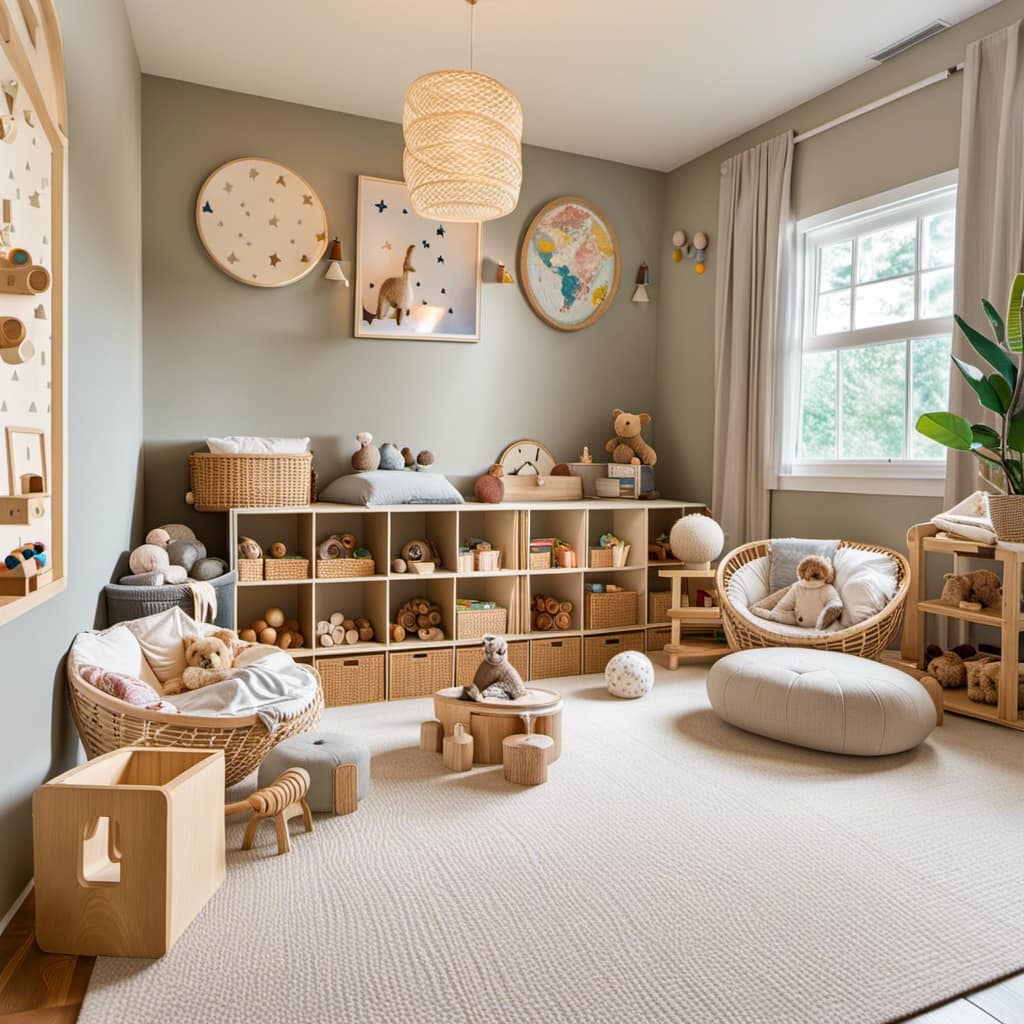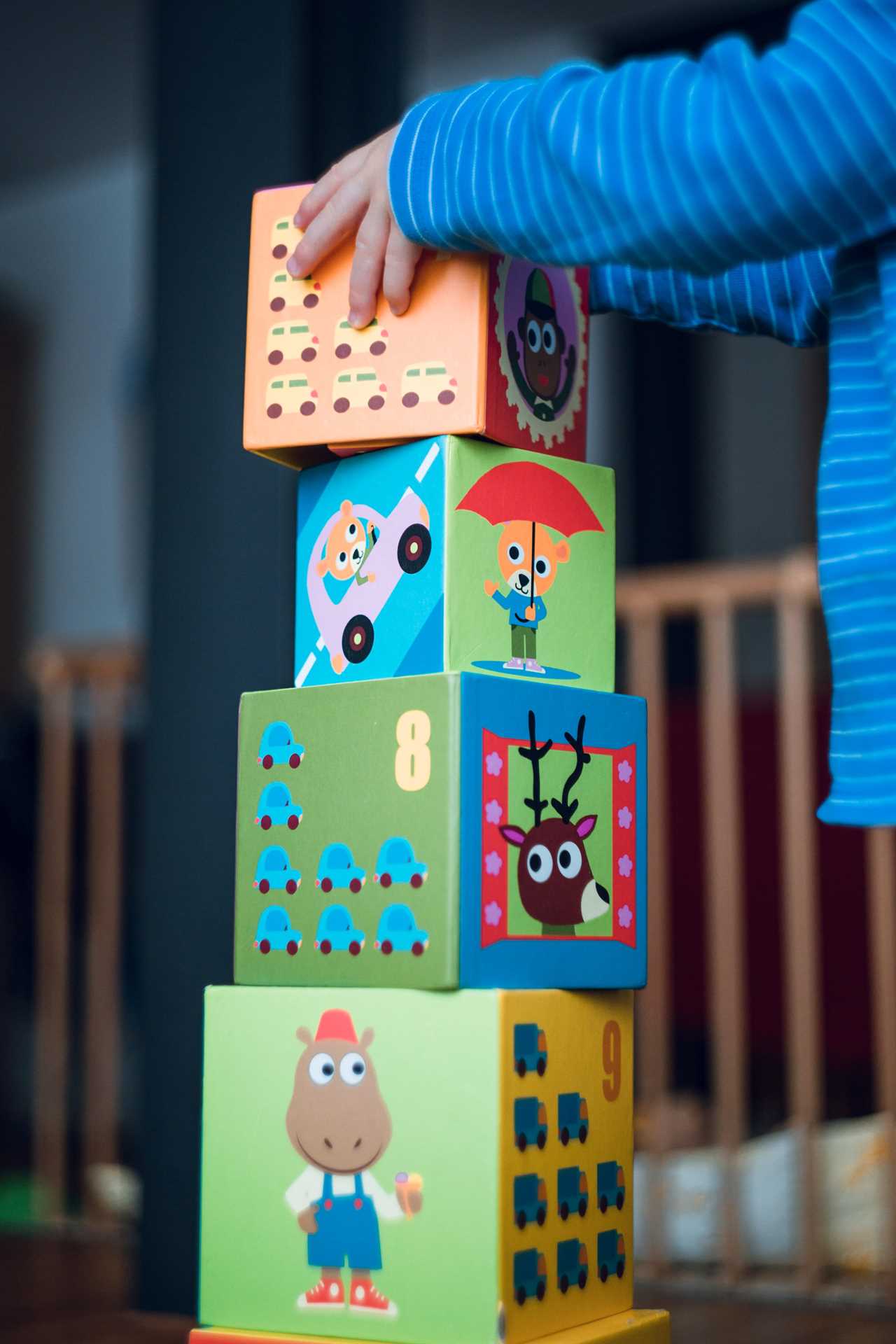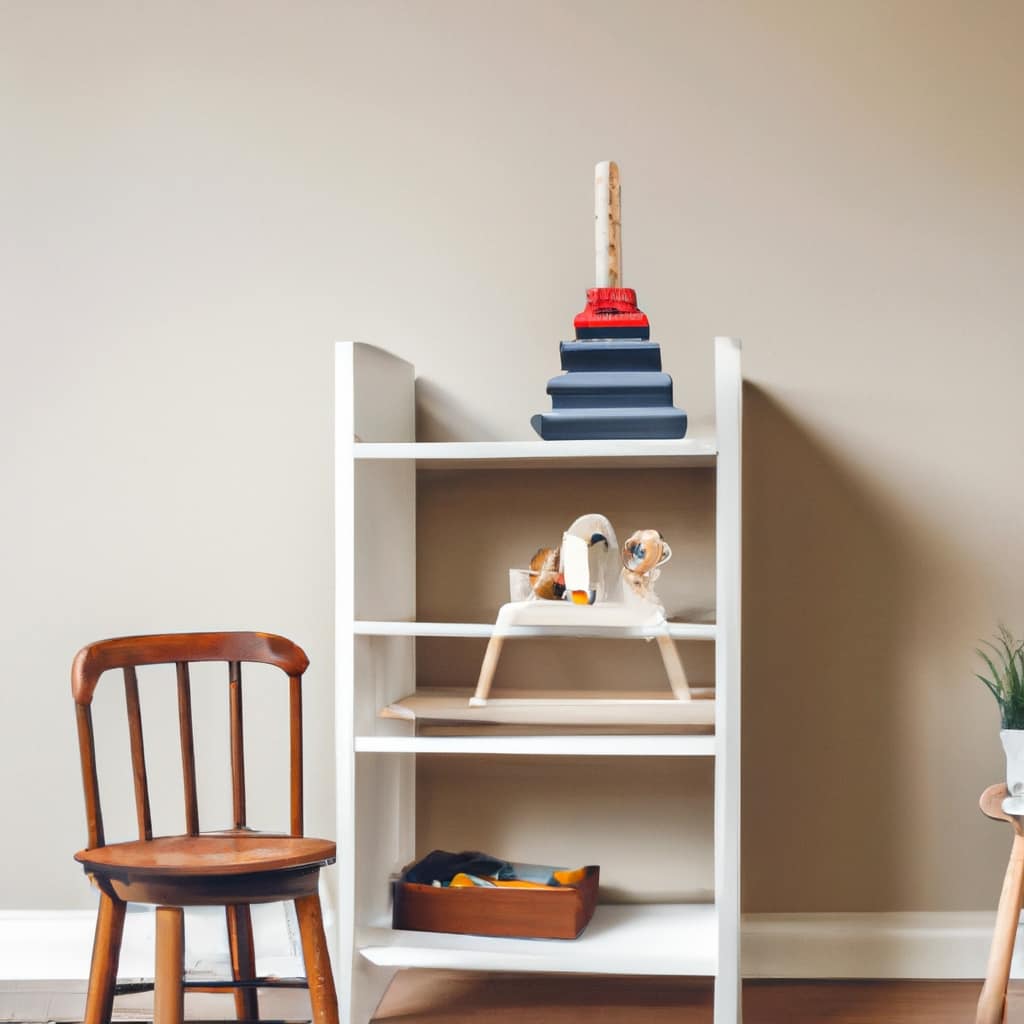I am excited to delve into the principles and theories behind Montessori toys as someone who loves educational toys.
These remarkable playthings, developed by Maria Montessori, are designed to engage children’s curiosity and promote independent thinking.
With a purposeful design that fosters creativity and exploration, Montessori toys provide age-appropriate activities that enhance cognitive development and language skills.
Through open-ended play, children can learn at their own pace and follow their unique interests.
Join me as we explore the fascinating world of Montessori toys and their impact on children’s development.
Key Takeaways
- Montessori toys were developed by Maria Montessori to support her child-centered approach to education.
- Montessori toys have a purposeful design that serves an educational purpose.
- Montessori toys encourage open-ended play, focus on individual interests and abilities, and promote self-discovery and personal growth.
- Montessori toys foster creativity and independent thinking in children.
The Child-Centered Approach to Education
I believe that the child-centered approach to education is the foundation of Montessori toys, as they were developed by Maria Montessori to support this approach. Montessori toys promote self-discovery and learning through hands-on exploration.
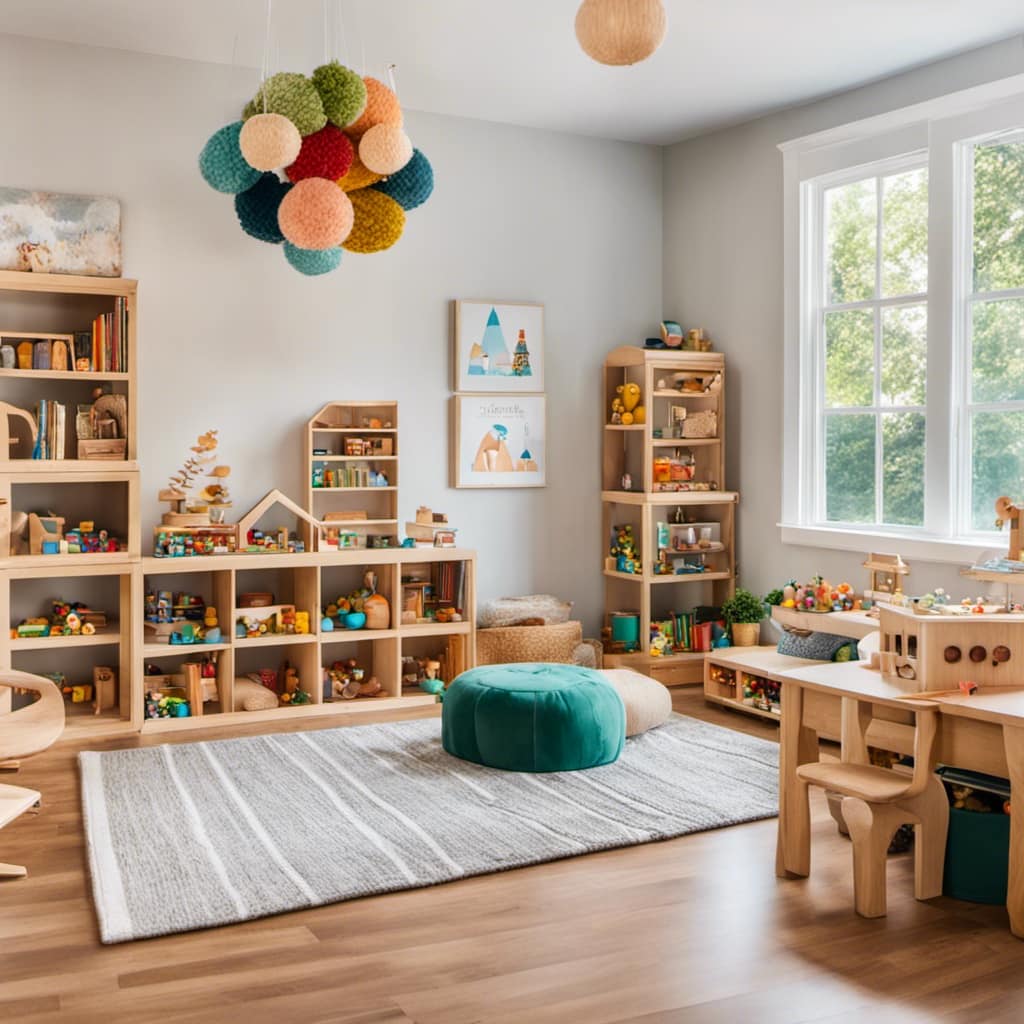
The child-centered learning philosophy emphasizes the importance of allowing children to take an active role in their education and development. Montessori toys are designed to engage children’s natural curiosity and promote independent thinking.
These toys encourage open-ended play, allowing children to follow their own interests and discover new concepts at their own pace. By providing age-appropriate activities and materials, Montessori toys foster a love for learning and empower children to become confident, self-directed learners.
Through play with Montessori toys, children develop important skills such as problem-solving, creativity, and critical thinking, all while having fun and enjoying the process of self-discovery.
Simple and Engaging Toy Design
The simple and engaging design of these toys promotes exploration and discovery. When it comes to sensory play and fine motor skills development, Montessori toys offer a range of benefits. Here are three reasons why these toys are so effective:
-
Sensory Stimulation: Montessori toys engage multiple senses, allowing children to explore different textures, colors, and sounds. This sensory stimulation enhances their cognitive development and helps them understand the world around them.
-
Fine Motor Skills Development: Montessori toys are designed to encourage hand-eye coordination and the development of fine motor skills. Activities like grasping, stacking, and manipulating objects help children refine their finger and hand movements, preparing them for more complex tasks in the future.
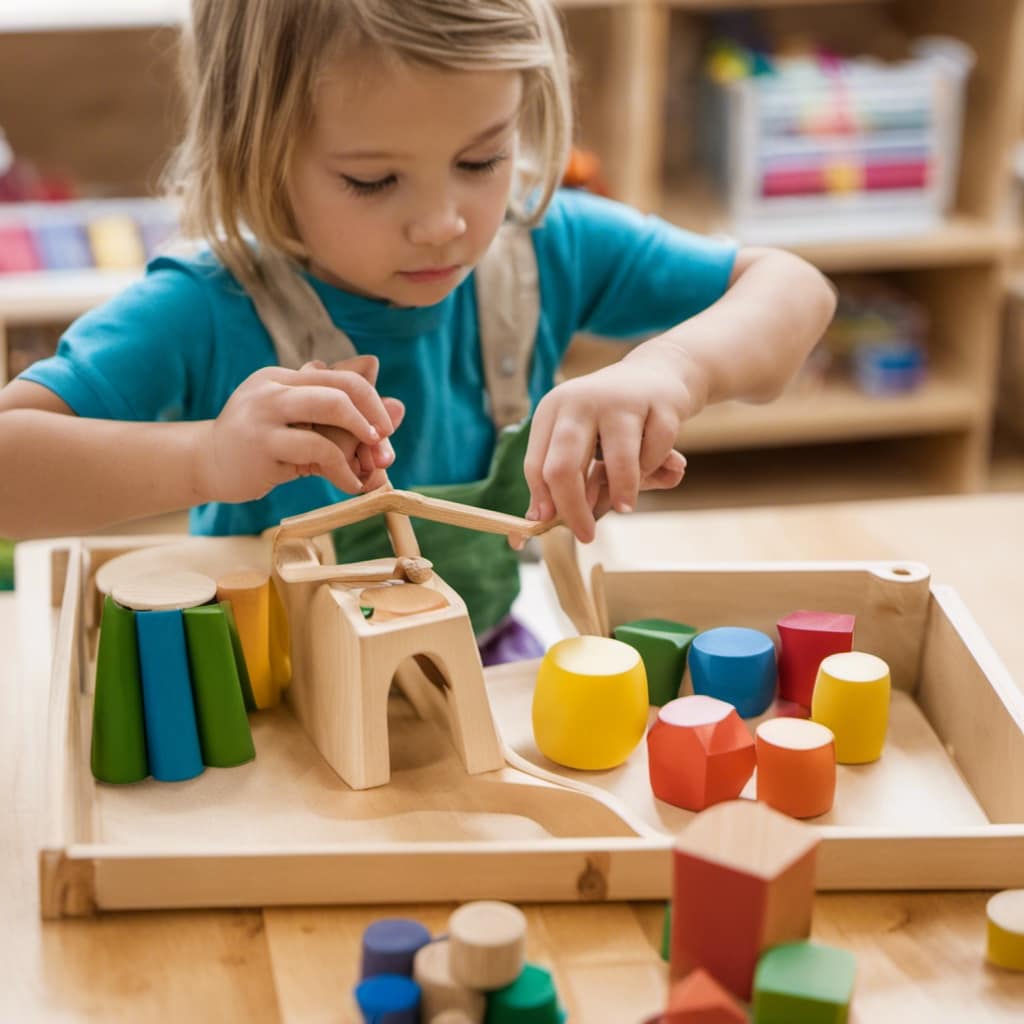
-
Independent Learning: Montessori toys promote independent thinking and self-discovery. By engaging in open-ended play, children have the freedom to explore and learn at their own pace, fostering creativity and problem-solving skills.
Overall, the thoughtful design of Montessori toys ensures that children not only have fun, but also develop important sensory and motor skills along the way.
Purposeful Design for Educational Growth
The purposeful design of these educational toys fosters growth and development in children. Montessori toys are specifically created to promote self-discovery and personal growth in young learners. Through their design, these toys encourage children to explore and engage in open-ended play, allowing them to follow their own interests and abilities.
By providing age-appropriate activities, Montessori toys support cognitive and language development, as well as stimulate imagination and creativity. They also promote independence, problem-solving skills, and critical thinking abilities. The intentional design of Montessori toys focuses on engaging multiple senses, fostering sensory development and fine motor skills.
Moreover, these toys play a significant role in social development, as they encourage interaction with others and help children build social skills. Overall, the purposeful design of Montessori toys contributes to educational growth by promoting self-discovery and personal growth in children.
Encouraging Open-Ended Play
Engaging in open-ended play with Montessori toys allows for endless possibilities and encourages creativity and imagination. These toys are designed to promote imaginative play, fostering self-discovery and growth in children. Here are three ways Montessori toys achieve this:
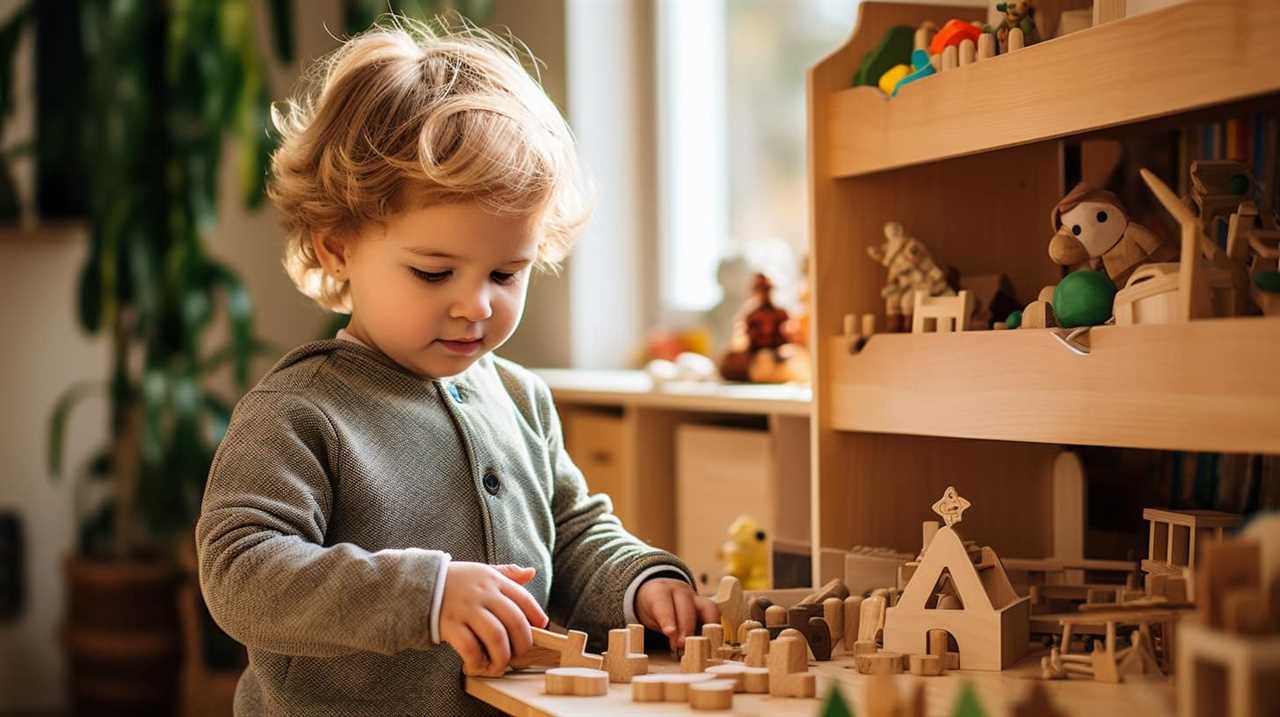
-
Freedom to Explore: Montessori toys provide children with the freedom to explore and create their own narratives. There are no predetermined rules or outcomes, allowing children to use their imagination and create their own stories and scenarios.
-
Open-Ended Materials: Montessori toys are often made from natural materials such as wood, allowing children to engage with the sensory aspects of play. These materials can be used in various ways, sparking creativity and encouraging problem-solving skills.
-
Focus on Process over Product: Montessori toys prioritize the process of play rather than the end result. This approach encourages children to experiment, make mistakes, and learn from them, promoting self-discovery and personal growth.
Fostering Creativity and Independent Thinking
Fostering creativity and independent thinking with Montessori toys is a key aspect of their educational approach.
Montessori toys are designed to promote imagination and self-discovery in children. These toys encourage open-ended play, allowing children to explore and create on their own terms.
By engaging with Montessori toys, children develop problem-solving skills and critical thinking abilities. The purposeful design of these toys stimulates their curiosity and encourages them to think outside the box.
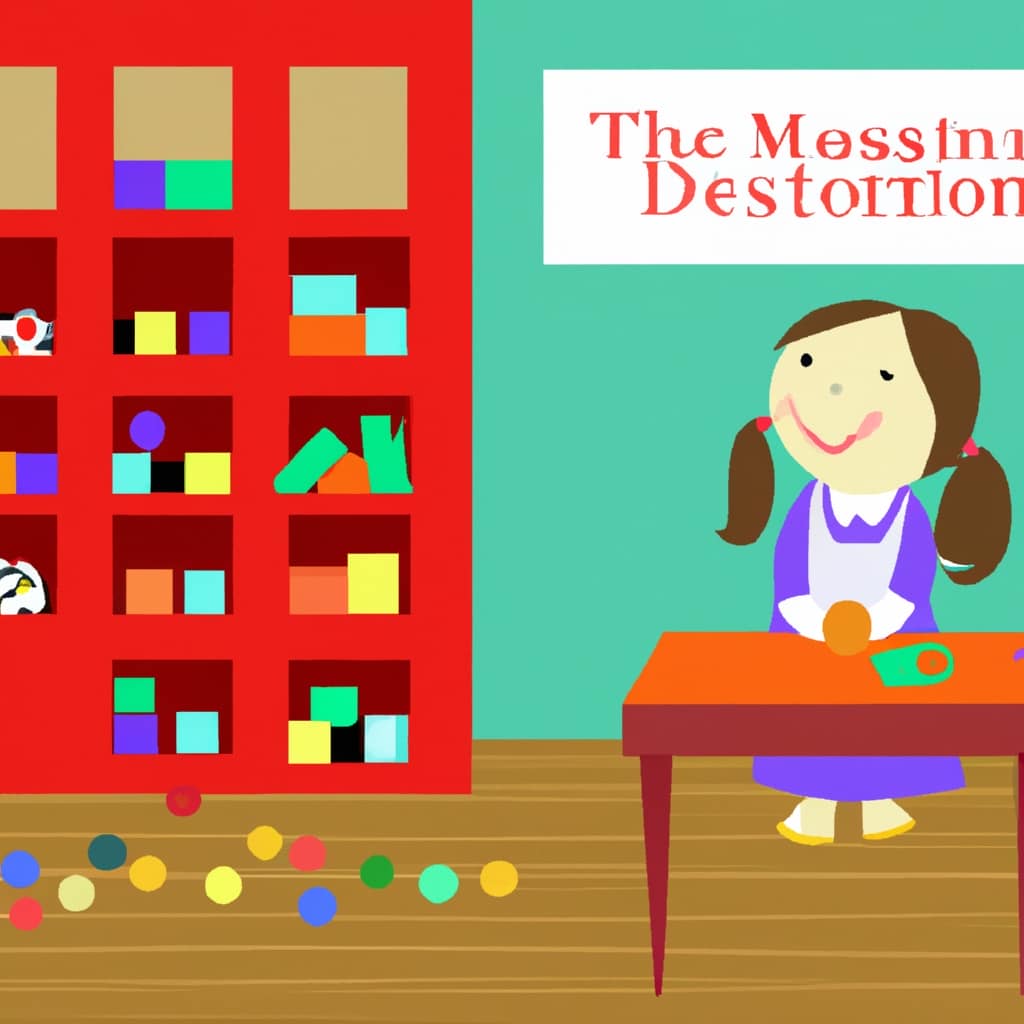
Through hands-on exploration and play, children are able to discover their own unique interests and abilities. This promotes independent thinking and self-confidence.
Montessori toys also provide opportunities for sensory development, allowing children to engage multiple senses and further enhance their cognitive abilities.
Overall, Montessori toys play a vital role in fostering creativity, imagination, and independent thinking in children.
Age-Appropriate Activities for Curiosity
As a parent, I believe it’s important to provide age-appropriate activities that spark my child’s curiosity. When it comes to exploring Montessori toys through sensory play, there are several ways to promote fine motor skills with age-appropriate activities.
-
Sensory Bins: Fill a bin with materials like rice, sand, or water beads and let your child explore different textures. This will help develop their fine motor skills as they scoop, pour, and manipulate the materials.
-
Sorting and Counting Games: Montessori toys like counting bears or shape sorters are great for promoting fine motor skills. Your child can practice grasping and manipulating objects while also learning important concepts like counting and sorting.

-
Puzzles and Lacing Activities: These activities help improve hand-eye coordination and fine motor skills. Start with simple puzzles and gradually increase the difficulty level to challenge your child’s skills.
Cognitive Development Through Play
I believe that play is a powerful tool for enhancing cognitive development.
Montessori toys play a significant role in promoting cognitive skills in children. Puzzles and memory games, for example, help develop problem-solving abilities. These activities require children to think critically, strategize, and find solutions.
Building blocks, on the other hand, enhance spatial awareness and pattern recognition. Through building structures, children learn about shapes, sizes, and how different pieces fit together. This helps them understand patterns and relationships.
Montessori toys engage children’s senses and stimulate their brains, allowing for a holistic cognitive development. By providing opportunities for exploration and discovery, these toys foster the growth of logical reasoning and problem-solving skills, while also promoting spatial awareness and pattern recognition.
Language Development With Hands-On Activities
Engaging in hands-on activities with language-focused toys enhances vocabulary, sentence formation, and storytelling skills. Here are three ways these toys can help with language development:
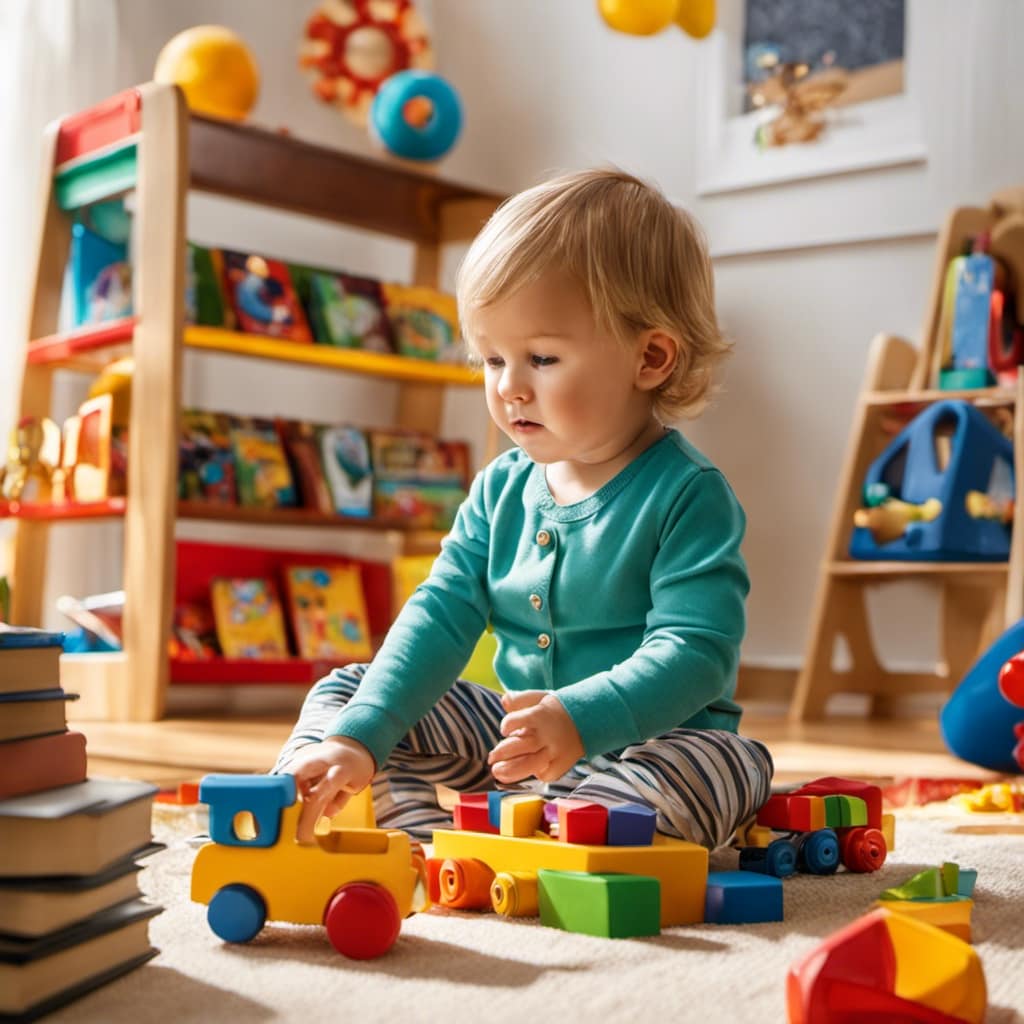
-
Vocabulary Expansion: Language-focused toys, such as word puzzles and flashcards, provide opportunities for children to learn new words and expand their vocabulary. By interacting with these toys, children can practice identifying and describing objects, which helps them develop a richer and more diverse set of words.
-
Sentence Formation: Language-focused toys often require children to use words in a meaningful context. By constructing sentences or telling stories with these toys, children learn how to put words together to form coherent and grammatically correct sentences. This helps them develop their sentence formation skills and improve their overall communication abilities.
-
Storytelling Skills: Language-focused toys, like storybooks and storytelling sets, encourage children to use their imagination and create narratives. Through storytelling, children practice organizing their thoughts, sequencing events, and using language to convey meaning. This enhances their storytelling skills and fosters their creativity and self-expression.
Frequently Asked Questions
How Can Montessori Toys Benefit a Child’s Emotional Development?
Montessori toys promote emotional development by fostering self-regulation and emotional intelligence. Through open-ended play and exploration, children learn to identify and manage their emotions, develop empathy, and build social skills. Montessori toys provide a supportive and nurturing environment for emotional growth.
Are There Any Specific Montessori Toys That Help With Sensory Development?
Sure, there are specific Montessori toys that can aid in sensory development, such as textured puzzles, sensory balls, and sensory bins. These toys encourage sensory exploration and help with sensory integration.
How Do Montessori Toys Promote Problem-Solving Skills in Children?
Montessori toys promote problem-solving skills in children by providing age-appropriate cognitive activities. These toys, such as puzzles and building blocks, enhance critical thinking and logical reasoning abilities, fostering cognitive development in a fun and engaging way.
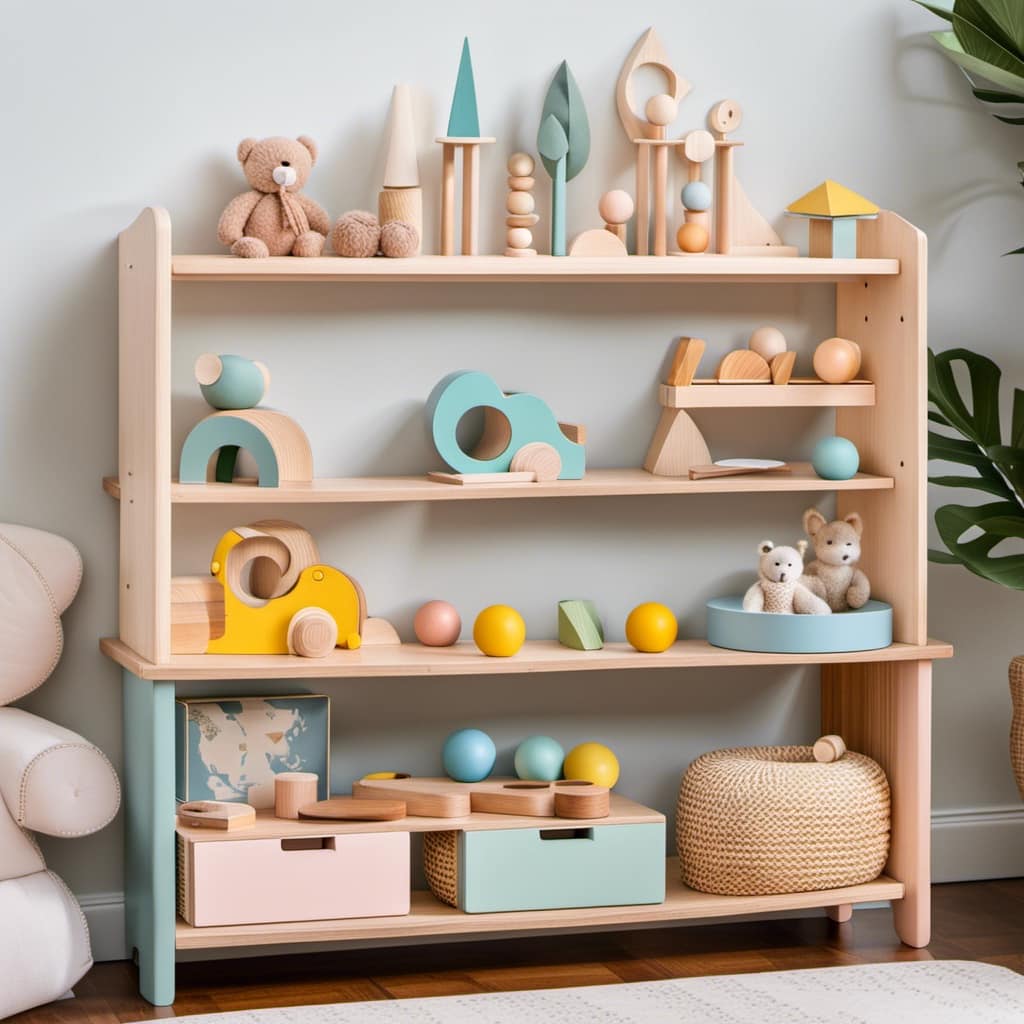
What Role Do Montessori Toys Play in Social Interaction and Building Social Skills?
Montessori toys play a crucial role in social interaction and building social skills. They provide opportunities for children to engage with others, develop empathy, and understand diverse experiences.
Are There Any Montessori Toys That Specifically Focus on Fine Motor Skill Development?
Yes, Montessori toys specifically focus on fine motor skill development. They include activities like threading beads, using tweezers, and manipulating small objects to enhance hand-eye coordination, dexterity, and finger strength.
Conclusion
Well, who knew that toys could actually be educational? I mean, I always thought they were just for fun. But after exploring the origins and principles of Montessori toys, I have to say, I’m impressed.
These toys are so much more than just playthings. They’re designed to engage children’s curiosity, promote independence, and develop critical thinking skills. And here I thought all they did was keep kids entertained.
I guess you really can learn something new every day, even from a toy!

